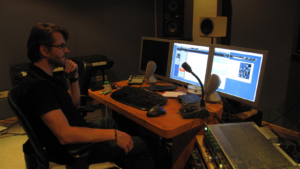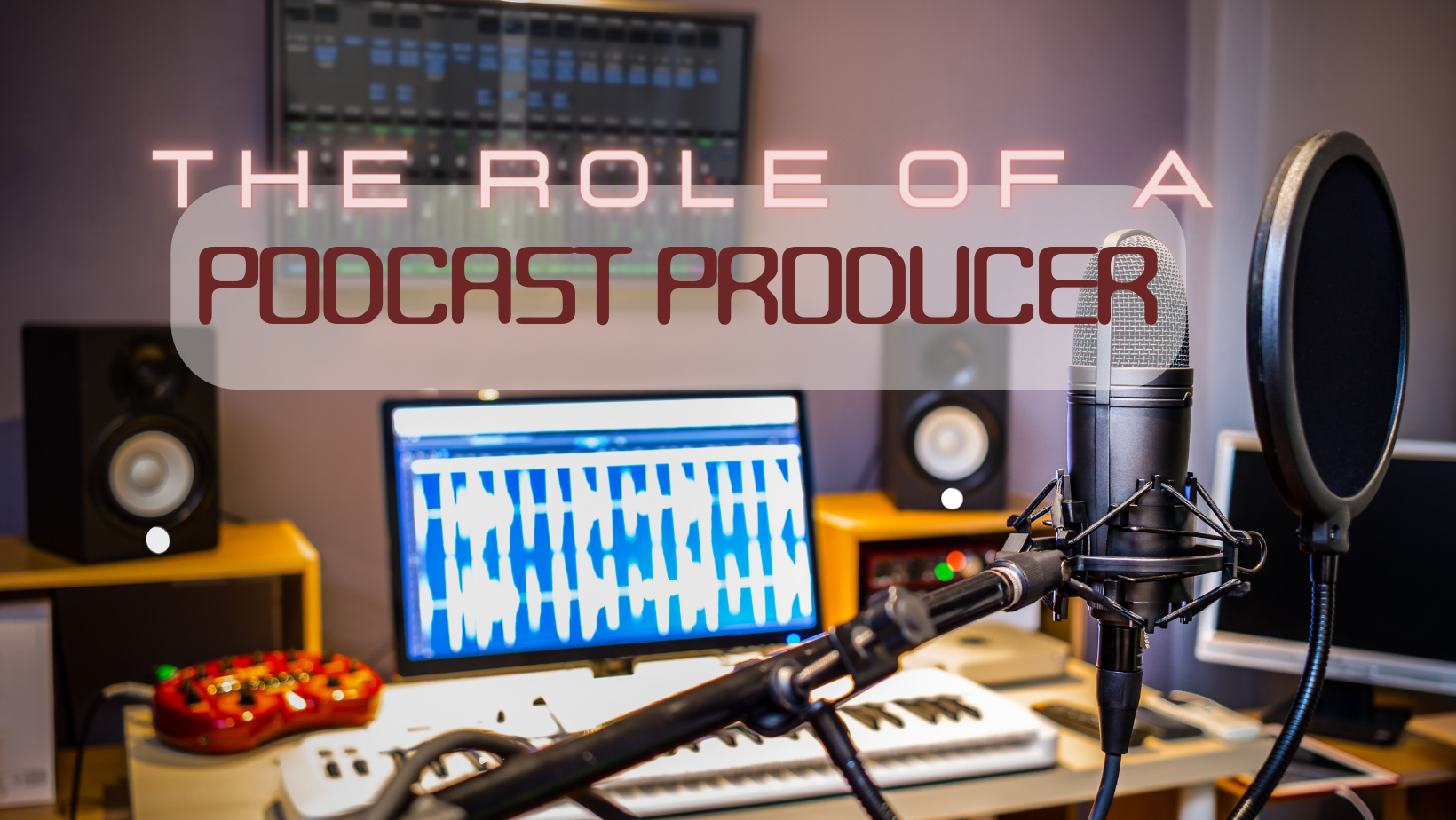Podcast Producer: a behind-the-scenes maestro who orchestrates the creation and distribution of podcasts. From coordinating interviews to editing audi
Podcast Producer: a behind-the-scenes maestro who orchestrates the creation and distribution of podcasts. From coordinating interviews to editing audio, they play an integral role in shaping the content we love to listen to. They are pivotal for ensuring that each episode is engaging, well-structured and aligns with the overall vision of the podcast.
In this blog post, we’re diving deep into what it really means to be a Podcast Producer – their responsibilities, expected earnings and job opportunities within this exciting field. So if you’ve ever wondered about the mechanics behind your favorite podcasts or considered dipping your toes into production yourself, keep reading!
What Is The Role Of A Podcast Producer
Generally, a podcast producer job description is divided into the following three sections:
A. Pre-Production Tasks
As a podcast producer, several pre-production tasks must be completed to ensure a successful podcast. These tasks are crucial to the overall success of the podcast and require a great deal of attention to detail and organization. This section will discuss four key pre-production tasks: researching topics and guests, scripting the podcast, booking guests, and coordinating with the host(s).
Researching topics and guestsOne of the most important tasks of a podcast producer is researching topics and potential guests. This involves identifying subjects that will be relevant and interesting to the target audience and finding guests who are knowledgeable and passionate about those subjects. The producer will need to spend a significant amount of time researching potential topics and guests, looking for new angles and perspectives that will help to make the podcast stand out. They may use various sources, such as news articles, academic journals, and social media, to identify potential topics and guests. Scripting the podcastWhile some podcasts are more free-form and improvisational, others require a more structured approach. In either case, a script can ensure that the podcast is well-organized and flows smoothly. The producer may work with the host(s) to develop an outline or script that outlines the main points of the podcast, the questions to be asked of guests, and any other important details. This can be especially important for podcasts that involve multiple hosts or guests, as it can help to ensure that everyone stays on topic and that the podcast stays on track. Booking guestsBooking guests’ tasks involves reaching out to potential guests, negotiating with them regarding scheduling and logistics, and ensuring they are prepared for the podcast. The producer must be persistent and persuasive, as securing high-profile guests can be challenging. They may need networking skills to connect and build relationships with potential guests. Additionally, they may need to work with the host(s) to prepare questions and talking points that will help to facilitate a productive and engaging conversation. Coordinating with the host(s)The podcast producer must coordinate with the host(s) to ensure everyone is on the same page. This involves communicating regularly with the host(s) to discuss topics, guests, and other important details and ensuring everyone knows their roles and responsibilities. The producer may need to provide guidance and feedback to the host(s) regarding their performance and may also need to troubleshoot any technical or logistical issues that arise. |

B. Production Tasks
Once the pre-production tasks have been completed, it is time to move on to the production phase of the podcast. This is where the actual recording of the podcast takes place.
Recording the podcastThe first step in the production phase is recording the podcast. This can be done in various ways, depending on the preferences and resources of the producer and the host(s). Some podcasts are recorded in a studio or other professional setting, while others are recorded remotely using software such as Zoom or Skype. Regardless of the method used, the producer must ensure that the recording equipment is set up properly and that the audio quality is high. They may need to troubleshoot technical issues, such as microphone problems or background noise, to ensure the recording is clean and clear. Editing the audioThen they must edit the audio. This involves reviewing the recording and removing any mistakes, pauses, or unwanted content. The producer may also need to adjust the volume levels, add fades, and make other technical adjustments to ensure smooth and polished audio sounds. This can be time-consuming, especially for longer podcasts, but it is essential for creating an engaging and professional final product. Adding sound effects and musicAdding sound effects and music can be a great way to enhance the overall production value of a podcast. This may include adding music beds or interstitial music and sound effects such as jingles, stingers, or sound bites. The producer will need to carefully select the music and sound effects appropriate for the podcast and ensure that they are used in a way that is not distracting or overwhelming. This can be a creative and fun process, but it is important to remember that the music and sound effects should enhance the content of the podcast rather than overshadow it. Mixing and mastering the audioLastly, the producer will need to mix and master the audio. This involves adjusting the levels and frequencies of the various tracks to create a balanced and cohesive final product. The producer may need to make further adjustments to the volume levels, add compression or other effects, and ensure that the audio is optimized for the intended distribution channels. This can be a technically challenging process, but it is essential for ensuring that the final product is of high quality and can be enjoyed by listeners on various devices and platforms. |

C. Post-Production Tasks
These tasks involve getting the finished podcast into the world and promoting it to potential listeners.
Uploading the podcast to the hosting platformThe first step in the post-production phase is uploading the finished podcast to the hosting platform. This involves creating an account on a podcast hosting platform like Libsyn or Buzzsprout and uploading the audio file. The producer must add metadata, such as the episode title, description, and artwork, and ensure that the podcast is properly formatted for distribution. The hosting platform will then distribute the podcast to various podcast directories, such as Apple Podcasts, Spotify, and Google Podcasts, making it available to a wider audience. Creating show notesShow notes are a written summary of the podcast episode, which can include timestamps, key takeaways, and links to resources mentioned in the episode. Show notes are important for SEO, as they help search engines understand the podcast’s content. They also provide value to listeners who may want to refer back to specific parts of the episode. The producer must create show notes for each episode and publish them on the podcast’s website or hosting platform. Promoting the podcast on social mediaPromoting the podcast on social media is essential to building an audience. The producer must create social media accounts for the podcast and regularly post updates, teasers, and behind-the-scenes content. They may also engage with listeners on social media, responding to comments and questions and building relationships with podcast fans. Social media promotion can drive traffic to the podcast’s website and increase visibility and engagement. Analyzing the podcast’s performanceAnalyzing the podcast’s performance is important for understanding how it resonates with its audience and identifying areas for improvement. The producer must monitor metrics such as downloads, listens, and engagement using tools such as Google Analytics and podcast hosting platform analytics. They may also solicit feedback from listeners, through social media or email surveys to better understand what is working well and what can be improved. Then they can use the information to guide future episodes and marketing efforts. |

Podcast Producer Salary
The salary can vary depending on several factors, such as their level of experience, the podcast’s size, and the podcast’s location. According to Glassdoor, the average salary for a podcast producer in the United States is around $50,000 to $60,000 annually. However, this can range from around $30,000 annually for entry-level positions to over $100,000 annually for experienced and highly skilled producers.
Freelance podcast producers may also charge hourly rates, ranging from around $20 to $75 or more per hour, depending on their experience and the project’s complexity.
Skills Required To Be A Successful Podcast Producer
 Technical skills
Technical skills
Podcasting requires certain technical knowledge, and the producer must be proficient in various software and hardware tools. The producer must be familiar with audio editing software such as Adobe Audition or Audacity and be able to edit audio files, add sound effects, and mix and master audio tracks. The producer must also know audio equipment, such as microphones, audio interfaces, and headphones, and be able to troubleshoot technical issues that may arise during the recording process.
In addition, the producer must have a basic understanding of website design and be able to create and manage a website for the podcast. This includes selecting a hosting platform, designing a website, and creating show notes for each episode.
 Communication skills
Communication skills
Communication skills are essential for podcast producers, who must coordinate with hosts, guests, and other team members. The producer must be able to communicate effectively, both verbally and in writing, and be able to provide clear direction to others. They must be able to listen actively and be open to feedback and suggestions.
In addition, the producer must be able to interview guests and elicit interesting stories and insights. This requires excellent listening skills and the ability to ask probing questions and keep the conversation flowing.
 Organizational skills
Organizational skills
Podcasting requires a great deal of organization, and the producer must be able to manage multiple tasks and deadlines. The producer must be able to schedule interviews, book guests, and coordinate with hosts and other team members. They must be able to manage files and folders and keep track of multiple versions of audio files.
In addition, the producer must be able to manage the podcast’s social media accounts, including creating content and engaging with followers. They must be able to prioritize tasks and manage their time effectively.
FAQs |
What kind of education or training do I need to become a podcast producer?While there are no strict requirements for education or training, having a degree or coursework in communications, media production, or a related field can be helpful. There are also online courses and workshops available that can teach technical skills like audio editing. What are some of the biggest challenges that podcast producers face?Podcast producers can face challenges such as coordinating schedules with hosts and guests, technical issues with audio equipment, and managing deadlines for multiple projects simultaneously. They may also need to adapt to new trends and technologies in the podcasting industry. How do I find job openings for podcast producers?Job openings for podcast producers can be found on job search websites, social media, and industry-specific websites. Networking with industry professionals and getting involved in podcasting communities can also help to find opportunities. Can a podcast producer work remotely?Yes, many podcast producers work remotely, especially with the rise of virtual recording and editing tools. |

Wrapping Up: Understanding the Essential Role of a Producer in a Podcast
So what does a podcast producer do? A podcast producer plays a critical role in podcasting, managing pre-production tasks, recording and editing audio, and handling post-production tasks such as promoting the podcast on social media. To ensure a successful podcast, the producer must possess technical, communication, and organizational skills. A podcast producer is important for creating high-quality content and freeing up the host’s time.
The future of podcasting looks bright, and the role of the producer will become even more important as the industry continues to grow, focusing on creating engaging content and staying up-to-date with emerging technologies.


COMMENTS